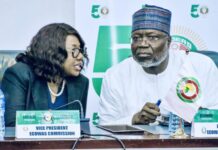The Executive Vice Chairman of Nigerian Communications Commission, NCC, Professor Umar Danbatta has affirmed the need for ethical leadership for sustainability in a post-oil era economy.
“Nigeria stands at the threshold of history and would definitely need ethical leaders to ensure sustainability in the post-oil era as government takes positive steps to diversify the economy,” he said in an address at the 2020 Annual Directors’ Conference organised by the Institute of Directors.
Part of his address reads: “Currently oil revenues are dwindling worldwide due to the discovery of alternative energy sources such as solar energy, nuclear energy and geothermal energy.
“This means that Nigeria cannot be solely dependent on oil earnings anymore. Consequently, the FG is looking for ways of diversifying the economy. Economic diversification is the process of shifting an economy away from a single income source toward multiple sources from a growing range of sectors and markets. This is with a view to increasing productivity, creating jobs and providing the basis for sustained economic growth.
Danbatta advised that,“In order to achieve National sustainability in the post-oil Nigerian economy, the highest standard of ethical leadership is required of all leaders especially in the public sector. This is because the government has enormous authoritative influence on citizens.
“Therefore, taxpayers expect a high level of integrity from their leaders. Peoples’ confidence and trust in the government increases when their leaders develop policies and take actions that promote the interests and wellbeing of the entire society. This is because public policies have a direct impact on the citizens. Therefore ensuring ethics in the public service is very important. In this regard, the Federal government came up with a Code of Conduct for public officers, which is spelt out in the Fifth Schedule, Part 1 of the 1999 Constitution. The aim of the code is to establish and maintain a high standard of integrity in the conduct of government business and to ensure that the actions and behavior of public officers conform to the highest standards of public morality and accountability.
He said, “Leaders at all levels are expected to exhibit ethical behavior not only to those they lead within public organizations and institutions but everyone in the society. They are expected to be committed to the principles and values of ethical leadership. It should be noted that the citizens are demanding higher standards of ethics, transparency and accountability. Therefore, the only thing that will take Nigeria out of its current economic crisis is the diversification of the economy and having ethical leaders who will manage its resources effectively and efficiently, by ensuring adequate planning and proper management of resources, all-inclusive growth and prudence.
“In conclusion, ethical leadership is essential for sustainable development of a Country. Nurturing an ethical leader is essential and this will determine the transformation and overall development of the Country. Nigeria stands at the threshold of history and would definitely need ethical leaders to ensure sustainability in the post-oil era as government takes positive steps to diversify the economy.”




